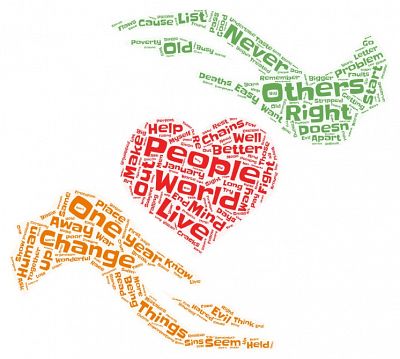An imaginative and interesting, poetic entry about human rights has won our "Dear Future Self" competition - a new competition that we created this year to help youngsters look to the future and think about their place in the world.
This year has been a year full of changes and challenges - not least for youngsters, who have faced substantial disruption to their education and social lives. In the midst of lockdown, in our interactions with teachers and educators, we learned many youngsters were feeling powerless, struggling to engage with the world, and were finding it hard to look to the future.
In order to help youngsters our Club, through our Vocational Committee, decided to set youngsters a fun, totally new challenge: to write a message to their future selves, based around an issue or a structure of their choice. The form of the message was entirely up to them - they could use anything from the traditional essay format to rap!
The panel of judges, former Rotarian Dr Deborah Connolly (Chair of Judges), Rotarian and Past President Viv Pritchard, and Dr Hellen Ward (Canterbury Christ Church University) have just announced the competition winners.
The judges were unanimous in deciding the winning entries, and the winning pupils are commended by the judges for their efforts. "It was a difficult decision, as the top 10 entries were all very good and had similar scores," said Deborah. "Most pupils wrote about climate change, and it was heartening to see how concerned and interested young people are about this serious issue."
The final list of winners, with some brief comments about each, is given below:
1. The first prize of £500 was won by Morgane from Queen Elizabeth's Grammar School, Faversham.
Morgane wrote an excellent and unusual poem about human rights that impressed all the judges. The poem, titled "The Right of All Humanity" was to be read in the future by a 30-yearold Morgane. In it is an impassioned plea to get involved in addressing issues of rights and inequalities - for instance, one part goes:
"Remember you are not ever alone
There are people who also want to fight for the same cause
This is not a battle you have to face on your own".
2. The second prize of £100 was won by Lily R from Queen Elizabeth's Grammar School, Faversham.
Lily wrote a heartfelt and well written essay about a beautiful old church in Ospringe and her concerns about the building's slow decay. It's quite clear from her poem just how much she feels for the church's structure, history and place in the community. Forlornly, she writes (to her future self): "By the time that you read this letter, the church will have surrendered itself to nature, and be nothing but the shell of the sanctuary it used to be". A wake-up call, perhaps, to all who care about this building and others like it?
3. The third prize of £50 was won by Jodie, also from Queen Elizabeth's Grammar School, Faversham.
Jodie wrote a very good essay about the risks of ignoring climate change, outlining what people need to do to protect the planet. It's another message in which the author realises that they have a role to play if things are to change. The closing line is: "For the sake of humanity's future, for my grandchildrens' and for you; my future self, I won't give up yet. When I look at myself, I'll ask: Are you doing as much as you can?"
Commendations and £30 book tokens were awarded to the following:
- Agata, from Kent College: an interesting reflection on an innovative, modern, forward-looking building and its place 40 years in the future, when it may have become a historic relic of "the twenties".
- Lilly, from The Folkestone School for Girls: another message about climate change, in which 12-year-old Lilly says to her future self: "If I could ask you anything, it would be 'will everything be ok?'”. Her hope is "One day I wish to walk out of my house with solar panels on every roof, trees and plants everywhere, a clear blue sky and a smile on everyone’s face as they breathe in the freshest, cleanest air."
- Mathew, from Queen Elizabeth's Grammar School, Faversham: An imaginative recap of many recent or current issues and personalities, including Captain Tom, ("Has a hospital been built in memory of Captain Tom?", he asks his future self), Brexit, US politics, Covid, the G7, climate change and HS2. "Good luck future me, I hope the world is in better shape and our future is looking optimistic. I hope in the next ten years, promises have been kept so that we can enjoy the future we’ve planned. Live our life, have fun and I hope that tomorrow will be a good day," he ends.
- Izzy, from Queen Elizabeth's Grammar School, Faversham: Another message focussed on climate change, interspersed with some humour as a young Izzy writes to her older self. She ends her message: "I wish you - us - the best, although that’s rather a weak sentiment when for all I know you could be floating in the middle of the ocean, grasping this letter and rolling your eyes as you read about my so-called confidence. Let’s hope it hasn’t come to that."
- Erin, from Simon Langton Girls' Grammar School: Erin entered two essays...the one that the judges particularly liked was about "15-minute cities" and the benefits for people’s quality of life and the planet; her other (also deemed quite good) was about climate change. Erin ends her message: "To my future self, I hope that this letter finds you with ’15-minute cities’ around the whole of the UK increasing everyone’s physical and mental wellbeing while contributing to the fight against climate change."
- Blanka, from King Ethelbert School, also believes we have the ability to change the future. Wondering about a future world, Blanka writes: "The world might even be ruled by giant robots or insects so you will have to live your whole entire life in bunkers or on a different planet, or you might be reading this in a rocket ship on your way to mars...[sic]" before ending by saying: "We don't know what will happen by then but, what we do know is that if we change now, then hopefully the future will look brighter."
The prizes will be sent to the schools to give out to their students. All the pupils will receive a certificate based on the poster, designed by Jake Leggatt from Queen Elizabeth's Grammar School, Faversham.
Competition organisers/creators, Rotarians Brian Dobinson and Julie Reza, commended all those who took part. "This really was a chance for youngsters to think about their role in society and how they, perhaps, can play a role and influence their own future and that of others," said Brian. Special congratulations go to Queen Elizabeth's School for having so many entries and winners.
We hope that teachers, parents, youth groups leaders and others will pick up on the "future self" idea to engage youngsters with the world around them and encourage them to play an active role in issues that they feel most passionate about.
Picture: A word cloud generated using words from the winning entry in Wordart. Picture credit: Rotary Club of Canterbury/Morgane/Wordart.



